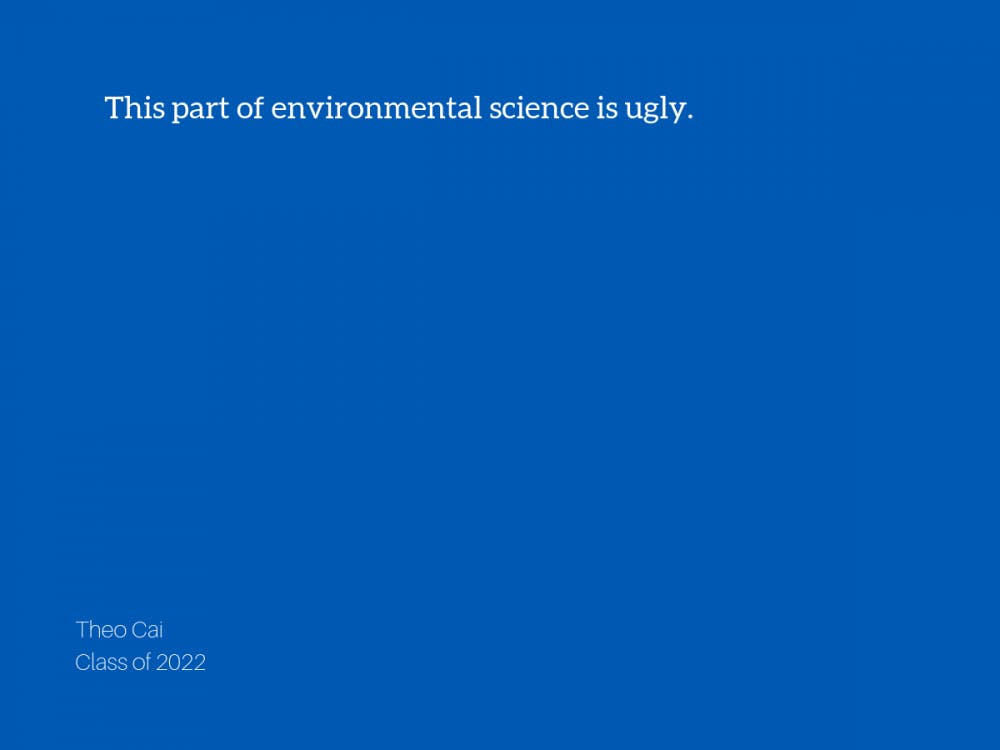Early into the spring semester of my freshman year at Duke, I was sitting in the front row of Environmental Hall 1114, fidgeting with the leaves of paper in front of me—my outline for our in-class debate on Malthus and his theory on population growth and control.
I was assigned the anti-Malthusian stance, which is to say, I was to argue that population growth was not a real concern, and that the planet had enough resources to support all of us. I did fine. The other side, the one arguing that the planet was rapidly reaching its maximum limit of human occupants and that population control was the only way to ensure a livable future, did fine, too. The class period ended and we packed up and left—that was that. We were done.
It wasn’t until almost a year later that I began to truly understand Malthus in context. Although traction behind his theory died down after an initial splash, a revival occurred mid-to-late 20th century and attracted new followers called “neo-Malthusians.” These modern Malthusians generally adhere to the original theory, with a stronger focus on two aspects: the degradation of the environment and contraception as a possible solution to overpopulation.
I agree that we must protect the environment. That is not my problem with these neo-Malthusians. My problem is with their second focus—contraception—and how it manifests as eugenics, full stop.
Contraception, historically, has played a huge role in eugenics. It’s the logical conclusion: there is the “fit” (Read: White, affluent, abled, Western European people) and the “unfit,” (Read: Black, poor, disabled, Eastern European people) and since we don’t want more of the “unfit,” we offer them contraceptives. Or we sterilize them by force.
White supremacy and eugenics might not be explicit in neo-Malthusian thought, but look under the hood and you will see them. Harry Fairfield Osborn Jr, author of Our Plundered Planet, which is credited as the spark for the neo-Malthusian movement, openly identified as a “distinguished Aryan enthusiast.” Club of Rome, a prominent neo-Malthusian non-profit, was once headed by David Rockefeller, who has expressed his concerns about overpopulation on many occasions. His family’s private foundation, the Rockefeller Foundation, funded Nazi eugenicists in the early 20th century. Garrett Hardin, author of the famous “Tragedy of the Commons” theory and creator of “lifeboat ethics,” wrote in his book, The Ostrich Factor; Our Population Myopia, that there was a need to restrict “unqualified reproductive rights,” and expressed support for race-specific intelligences–namely the claim that African-Americans’ average IQ was 85.
So it’s clear that these neo-Malthusians are simultaneously white supremacists and eugenicists. But is it possible that they’re right about the peril of overpopulation? The short answer is: no. The long answer is ‘it’s complicated’ and I admit I’m no expert, but even if Malthus were right about everything, the harm produced by his theory still stands–painfully relevant and permanent.
I didn’t know any of this when I was a freshman, preparing for that class debate. Malthus, his subsequent followers, and their marriage to white supremacy and eugenics weren’t anywhere in the pre-debate reading material. My professor and the TAs were silent during the debate itself, simply taking notes and calling time. It wasn’t until one year and one shocking discovery later that their silence began to sound loud.
There is a deafening silence throughout the rest of the field of Environmental Science, too. A new iteration of Malthusian thought is on the rise: eco-fascism. It’s what it says on the tin–environmentalism through the lens of white supremacy and genocide. The Christchurch shooter explicitly identified as an “eco-fascist.” The El-Paso shooter was similarly inspired, believing that the only way to avoid ecological collapse was “if we can get rid of enough people.” It might seem like the ‘wrong people’ are co-opting the well-meaning field of environmental science, but, when put into historical context, eco-fascism comes into view as the logical offspring of early environmental thought.
This part of environmental science is ugly. I understand the impetus to want to teach Malthus for the sake of his historical importance, while omitting the violent legacy of his work, but I don’t think it’s right. During the debate my freshman year, Malthus’ side and the anti-Malthus’ side were presented as equally valid and rational, even though any true, contemporary proponent of Malthus would want me personally sterilized and culled.
The omission of the historical context surrounding Malthus is not just irresponsible–it is an outright act of violence. It normalizes dangerous ideologies and attracts white supremacists and eugenicists into our fold. As educators, students and members of the Duke community, we have a responsibility to reject them all, to explicitly condemn eco-fascism in all its forms–past and present.
But most importantly, we have a responsibility to welcome others. To protect our most vulnerable friends and community members. To assure them that they have a space in the “lifeboat,” too–that we all do. To lean off the side, grasp their reaching hand and hoist them up.
Theo Cai is a Trinity sophomore.
Get The Chronicle straight to your inbox
Signup for our weekly newsletter. Cancel at any time.

